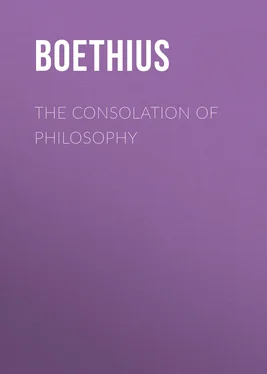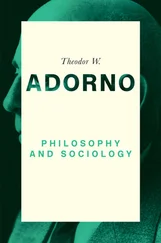'Why, then, ye children of mortality, seek ye from without that happiness whose seat is only within us? Error and ignorance bewilder you. I will show thee, in brief, the hinge on which perfect happiness turns. Is there anything more precious to thee than thyself? Nothing, thou wilt say. If, then, thou art master of thyself, thou wilt possess that which thou wilt never be willing to lose, and which Fortune cannot take from thee. And that thou mayst see that happiness cannot possibly consist in these things which are the sport of chance, reflect that, if happiness is the highest good of a creature living in accordance with reason, and if a thing which can in any wise be reft away is not the highest good, since that which cannot be taken away is better than it, it is plain that Fortune cannot aspire to bestow happiness by reason of its instability. And, besides, a man borne along by this transitory felicity must either know or not know its unstability. If he knows not, how poor is a happiness which depends on the blindness of ignorance! If he knows it, he needs must fear to lose a happiness whose loss he believes to be possible. Wherefore, a never-ceasing fear suffers him not to be happy. Or does he count the possibility of this loss a trifling matter? Insignificant, then, must be the good whose loss can be borne so equably. And, further, I know thee to be one settled in the belief that the souls of men certainly die not with them, and convinced thereof by numerous proofs; it is clear also that the felicity which Fortune bestows is brought to an end with the death of the body: therefore, it cannot be doubted but that, if happiness is conferred in this way, the whole human race sinks into misery when death brings the close of all. But if we know that many have sought the joy of happiness not through death only, but also through pain and suffering, how can life make men happy by its presence when it makes them not wretched by its loss?'
Who founded firm and sure
Would ever live secure,
In spite of storm and blast
Immovable and fast;
Whoso would fain deride
The ocean's threatening tide;—
His dwelling should not seek
On sands or mountain-peak.
Upon the mountain's height
The storm-winds wreak their spite:
Конец ознакомительного фрагмента.
Текст предоставлен ООО «ЛитРес».
Прочитайте эту книгу целиком, купив полную легальную версию на ЛитРес.
Безопасно оплатить книгу можно банковской картой Visa, MasterCard, Maestro, со счета мобильного телефона, с платежного терминала, в салоне МТС или Связной, через PayPal, WebMoney, Яндекс.Деньги, QIWI Кошелек, бонусными картами или другим удобным Вам способом.
Π (P) stands for the Political life, the life of action; θ (Th) for the Theoretical life, the life of thought.
The Stoic, Epicurean, and other philosophical sects, which Boethius regards as heterodox. See also below, ch. iii., p. 14 'Could I desert thee, child,' said she, 'and not lighten the burden which thou hast taken upon thee through the hatred of my name, by sharing this trouble? Even forgetting that it were not lawful for Philosophy to leave companionless the way of the innocent, should I, thinkest thou, fear to incur reproach, or shrink from it, as though some strange new thing had befallen? Thinkest thou that now, for the first time in an evil age, Wisdom hath been assailed by peril? Did I not often in days of old, before my servant Plato lived, wage stern warfare with the rashness of folly? In his lifetime, too, Socrates, his master, won with my aid the victory of an unjust death. And when, one after the other, the Epicurean herd, the Stoic, and the rest, each of them as far as in them lay, went about to seize the heritage he left, and were dragging me off protesting and resisting, as their booty, they tore in pieces the garment which I had woven with my own hands, and, clutching the torn pieces, went off, believing that the whole of me had passed into their possession. And some of them, because some traces of my vesture were seen upon them, were destroyed through the mistake of the lewd multitude, who falsely deemed them to be my disciples. It may be thou knowest not of the banishment of Anaxagoras, of the poison draught of Socrates, nor of Zeno's torturing, because these things happened in a distant country; yet mightest thou have learnt the fate of Arrius, of Seneca, of Soranus, whose stories are neither old nor unknown to fame. These men were brought to destruction for no other reason than that, settled as they were in my principles, their lives were a manifest contrast to the ways of the wicked. So there is nothing thou shouldst wonder at, if on the seas of this life we are tossed by storm-blasts, seeing that we have made it our chiefest aim to refuse compliance with evil-doers. And though, maybe, the host of the wicked is many in number, yet is it contemptible, since it is under no leadership, but is hurried hither and thither at the blind driving of mad error. And if at times and seasons they set in array against us, and fall on in overwhelming strength, our leader draws off her forces into the citadel while they are busy plundering the useless baggage. But we from our vantage ground, safe from all this wild work, laugh to see them making prize of the most valueless of things, protected by a bulwark which aggressive folly may not aspire to reach.'
.
The distance from Rome to Pavia, the place of Boethius' imprisonment, is 455 Roman miles.
The moon is regarded as farthest from the sun at the full, and, as she wanes, approaching gradually nearer.












